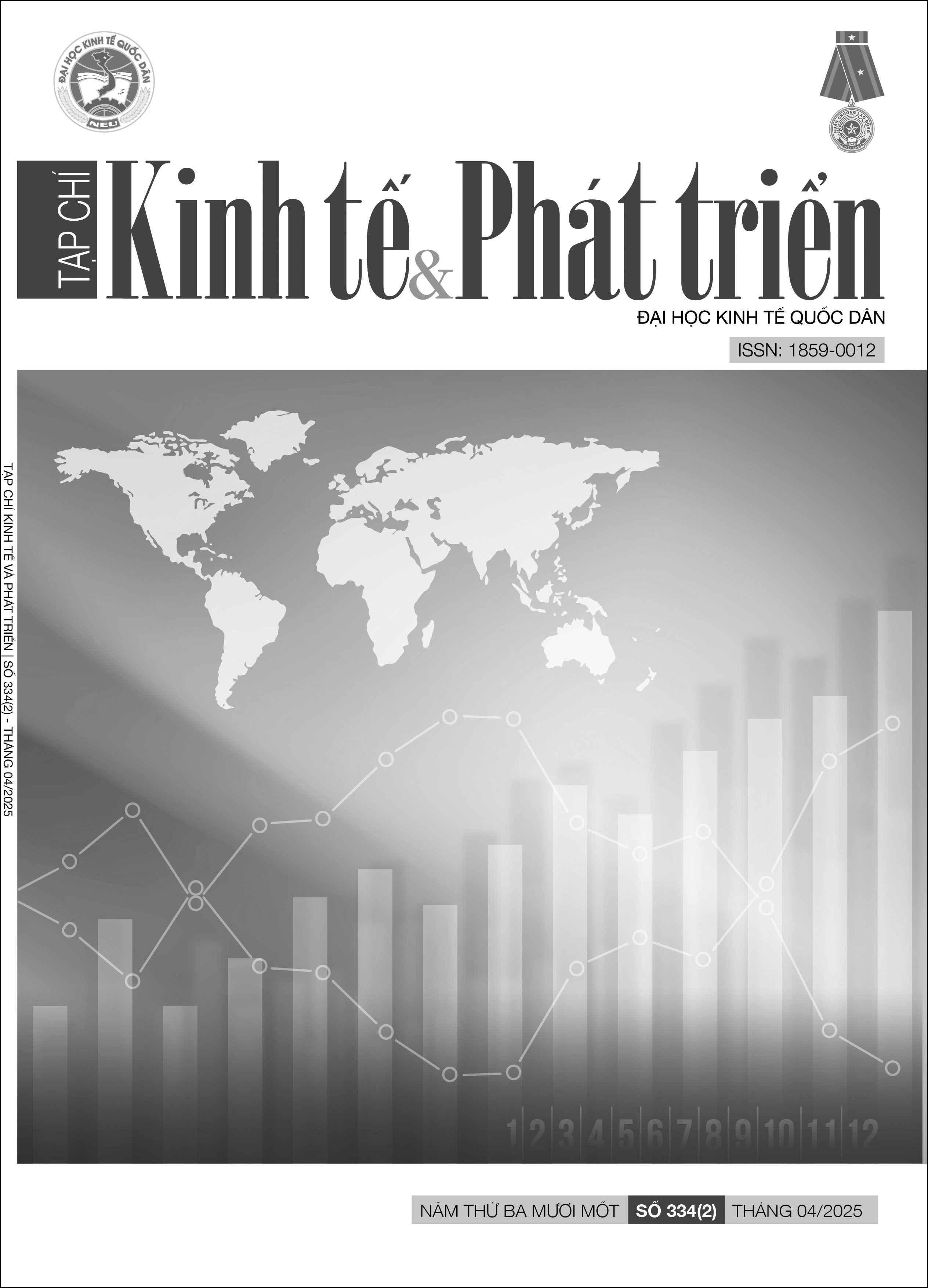Tác động của xếp hạng tín nhiệm quốc gia đến thu hút vốn FDI: Nghiên cứu trường hợp các nước khu vực Châu Á
DOI:
https://doi.org/10.33301/JED.VI.2260Từ khóa:
Châu Á, FDI, xếp hạng tín nhiệmTóm tắt
Nghiên cứu này đánh giá tác động của xếp hạng tín nhiệm quốc gia (SCR) đối với dòng vốn đầu tư trực tiếp nước ngoài (FDI) tại 28 quốc gia châu Á trong giai đoạn 2000-2023. Sử dụng mô hình Vector tự hồi quy trên dữ liệu bảng (PVAR) và phương pháp ước lượng GMM, nghiên cứu phân tích mối quan hệ giữa SCR, FDI cùng các biến kiểm soát như thu nhập bình quân đầu người (GPC), độ mở thương mại (OTR), sự ổn định chính trị (SPV), và lạm phát (INF). Kết quả cho thấy SCR không có tác động trực tiếp đáng kể đến FDI trong ngắn hạn, nhưng GPC ảnh hưởng mạnh đến SCR, trong khi FDI lại góp phần cải thiện sự ổn định chính trị. Đặc biệt, FDI thể hiện tính quán tính cao, nghĩa là dòng vốn đầu tư trong quá khứ có tác động tích cực đến dòng vốn hiện tại. Nghiên cứu đóng góp mới bằng việc làm rõ vai trò gián tiếp của SCR và nhấn mạnh tầm quan trọng của các yếu tố kinh tế vĩ mô nội địa trong việc thu hút FDI tại châu Á, từ đó đưa ra các hàm ý chính sách hướng đến cải thiện môi trường đầu tư và thúc đẩy tăng trưởng bền vững.
Tài liệu tham khảo
Adam, N.A. & Alzuman, A. (2024), ‘Effect of per capita income, GDP growth, FDI, sectoral composition, and domestic credit on employment patterns in GCC countries: GMM and OLS analysis’, Economies, 12(11), 315. MDPI. https://doi.org/10.3390/economies12110315.
Biglaiser, G., Lee, H. & Yoo, S.H. (2025), ‘Foreign asset expropriation and sovereign bond ratings in the developing world’, Business and Politics, 27(1), 45-67. https://doi.org/10.1017/bap.2025.1.
Cai, P., Gan, Q. & Kim, S.J. (2018), ‘Do sovereign credit ratings matter for foreign direct investments?’, Journal of International Financial Markets, Institutions and Money, 54, 208-229. https://doi.org/10.1016/j.intfin.2017.12.004.
Cash, D. & Khan, M. (2024), Rating the globe: Reforming credit rating agencies for an equitable financial architecture, United Nations University, from <https://collections.unu.edu/eserv/UNU:9832/rating_the_globe.pdf>.
Chen, S.S., Chen, H.Y., Chang, C.C. & Yang, S.L. (2016), ‘Output spillovers from changes in sovereign credit ratings’, Journal of International Money and Finance, 64, 35-50. https://doi.org/10.1016/j.jimonfin.2016.02.007.
Chrystella, D.F., Ibrahim, S. & Lihua, Y. (2024), Maximizing the impact of foreign direct investment: Trends, determinants, and strategies for sustainable economic and social development, from <https://www.researchgate.net/publication/388736735_Maximizing_The_Impact_Of_Foreign_Direct_Investment>.
Duygun, M., Ozturk, H. & Shaban, M. (2016), ‘The impact of sovereign credit rating downgrades on foreign direct investment: Evidence from emerging markets’, Journal of International Financial Markets, Institutions and Money, 45, 87-102. https://doi.org/10.1016/j.intfin.2016.06.001.
Emara, N. & El Said, A. (2021), ‘Sovereign ratings, foreign direct investment, and contagion in emerging markets: Does being a BRICS country matter?’, International Journal of Finance & Economics. https://doi.org/10.1002/ijfe.2062.
Hill, P., Bissoondoyal-Bheenick, E. & Faff, R. (2018), ‘Do sovereign credit ratings matter for foreign direct investments?’, Journal of International Financial Markets, Institutions and Money, 54, 208-229. https://doi.org/10.1016/j.intfin.2018.01.003.
Irianto, S., Purwanto, C.S. & Purba, C.S. (2018), ‘Economic system convergence in globalization era and its implication on renewal and economic law in Indonesia’, International Journal of Multi-Disciplinary Research, from <https://pdfs.semanticscholar.org/c54b/6137ef82d866fa913ea33ccb6d48c47caae1.pdf>.
Kararach, G. (2025), The new global development finance: Africa, the rating agencies and combatting risk misperceptions, Springer. https://doi.org/10.1007/978-3-031-80478-6_12
Kim, S.J. & Wu, E. (2008), ‘Sovereign credit ratings, capital flows and financial sector development in emerging markets’, Emerging Markets Review, 9(1), 17-39. https://doi.org/10.1016/j.ememar.2007.06.001
Koc, M. (2024), ‘The relationship between foreign direct investments and CDS premiums in Türkiye: Time-varying causality test (2011-2023)’, Alanya Akademik Bakış, 8(2), 145-162.
Mathebula, N.C. (2024), ‘Indicators of sovereign risk of South Africa’s international monetary fund loan: The nexus between political risks and economic growth’, Journal of Governance Risk Management, from <https://ujcontent.uj.ac.za/view/pdfCoverPage?instCode=27UOJ_INST&filePid=1310979960007691&download=true>.
Mulliez, A., Bellefontaine, S., Terrieux, M. & Balineau, G. (2024), ‘International economy: Is FDI running dry?’, AFD Macrodev, AFD, from <https://shs.cairn.info/journal-afd-macrodev-2024-57-page-1>.
Reinhart, C.M. (2002), ‘Default, currency crises, and sovereign credit ratings’, The World Bank Economic Review, 16(2), 151-170.
Surguladze, T. & Bliadze, T. (2025), Policy paper N2025/02, ISET Policy Institute, from <https://iset-pi.ge/storage/media/other/2025-01-14/3dd08c20-d285-11ef-b1f3-e1c71673f37b.pdf>.
UNCTAD (2024), World investment report 2024, retrieved on February 27th 2025, from <https://unctad.org/publication/world-investment-report-2024>.
Wenxuan, S. (2024), The impact of China's outward foreign direct investment on the bilateral trade with Belt and Road countries: The case of Central Eastern European countries, Uni-Corvinus, from <https://www.uni-corvinus.hu/downloads/9pap.1pm7ked/phd-dissertation-draft-2024-song-wenxuan-20240821.pdf>.





